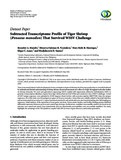Growth response and carcass composition of red tilapia fry fed diets with varying protein levels and protein to energy ratios
| dc.contributor.author | Santiago, Corazon B. | |
| dc.contributor.author | Laron, Manuel A. | |
| dc.contributor.editor | De Silva, S. S. | |
| dc.date.accessioned | 2011-06-22T09:35:23Z | |
| dc.date.available | 2011-06-22T09:35:23Z | |
| dc.date.issued | 1991 | |
| dc.identifier.citation | Santiago, C. B., & Laron, M. A. (1991). Growth response and carcass composition of red tilapia fry fed diets with varying protein levels and protein to energy ratios. In S. S. De Silva (Ed.), Fish Nutrition Research in Asia. Proceedings of the Fourth Asian Fish Nutrition Workshop, 3-8 September 1990, Vijayawada, Andhra Pradesh, India (pp. 55–62). Manila, Philippines: Asian Fisheries Society. | en |
| dc.identifier.uri | http://hdl.handle.net/10862/348 | |
| dc.description.abstract | An 8-week feeding experiment was conducted with red tilapia (Oreochromis ) fry of 0.160 plus or minus 0.035 g initial weight. Twelve diets of 4 protein levels (25, 30, 35 and 40%) and 3 protein to energy (P/E) ratios (111, 100 and 80 mg protein/kcal) at each protein level were used. The highest growth was attained by fry fed a 40% protein diet with a P/E ratio of 111 mg/kcal. A lower but not a significantly different growth response was attained by fry on a 35% protein diet with a P/E ratio of 111 mg/kcal and a 30% protein diet with a P/E ratio of 100. Protein efficiency ratio was affected by the dietary protein level. Feed conversion ratio was not significantly influenced by the dietary protein level nor the P/E ratio. Carcass moisture content (%) was affected only by the P/E ratio. Carcass moisture content was directly related to the P/E ratio of the diets and was inversely related to the digestible energy (DE) level. Both protein level and P/E ratio significantly influenced carcass lipid content (%) on a dry matter basis but not the ash content. Carcass lipid (5) increased with increasing dietary protein and increasing DE levels of the diet, but decreased with increasing P/E ratio. Carcass protein content decreased significantly with the decrease of P/E ratio and increase of DE level of the diet. | en |
| dc.language.iso | en | en |
| dc.publisher | Asian Fisheries Society | en |
| dc.subject | Oreochromis | en |
| dc.subject.lcc | VF SP 140 | |
| dc.title | Growth response and carcass composition of red tilapia fry fed diets with varying protein levels and protein to energy ratios | en |
| dc.type | Conference paper | en |
| dc.citation.spage | 55 | |
| dc.citation.epage | 62 | |
| dc.citation.conferenceTitle | Fish Nutrition Research in Asia. Proceedings of the Fourth Asian Fish Nutrition Workshop, 3-8 September 1990, Vijayawada, Andhra Pradesh, India | en |
| dc.subject.asfa | artificial feeding | en |
| dc.subject.asfa | bioenergetics | en |
| dc.subject.asfa | diet | en |
| dc.subject.asfa | feed efficiency | en |
| dc.subject.asfa | fish culture | en |
| dc.subject.asfa | proteins | en |
Files in this item
| Files | Size | Format | View |
|---|---|---|---|
|
There are no files associated with this item. |
|||
This item appears in the following Collection(s)
-
Conference Proceedings [300]




